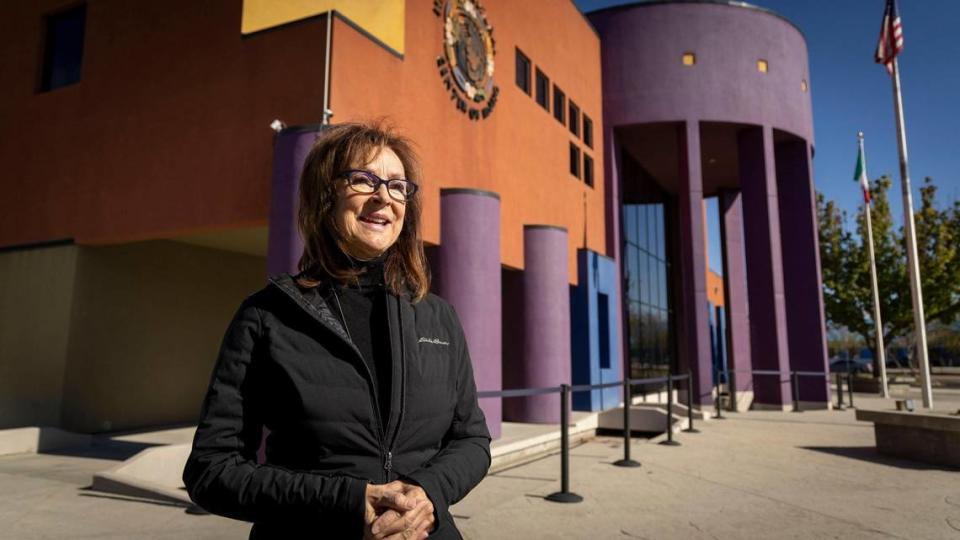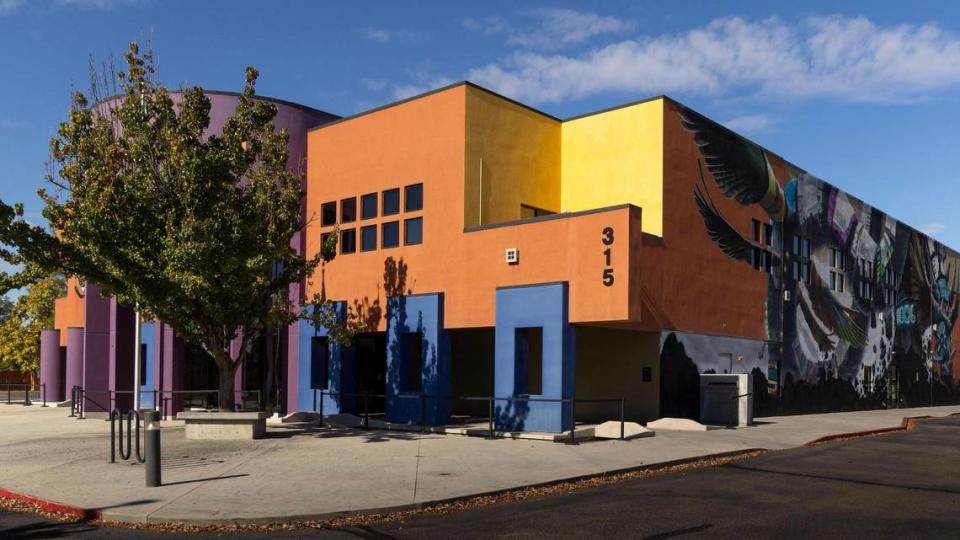After stalls and funding questions, Nampa plans a future for Hispanic Cultural Center
Since Nampa city officials took over operations of the Hispanic Cultural Center of Idaho last summer, day-to-day operations at the center have been a struggle. With one city employee tasked to run events, the building has brought in just around $12,500 in revenue since the shift in ownership five months ago.
But city officials said they’re finally making progress toward better serving Nampa’s Latino community.
Nampa council members have established an advisory council to decide how to proceed with the center’s operations, and rented out two new rooms at the center. City officials have made over $60,000 in repairs to the building so far and also plans to hire its first full-time staff member to manage the center.
The moves followed council members’ criticisms that the city hasn’t made much progress since it took control of the center.
“Right now we are in a holding pattern,” Nampa City Council Member Victor Rodriguez said in a November meeting. “Nothing is getting done. We need to start making money and need to start bringing in revenue, and we need a person that will control that and get us on our feet and moving forward.”
The full-time position to operate the center will open sometime this month, city spokesperson Amy Bowman told the Idaho Statesman by email. Mayor Debbie Kling said she expects the position to cost around $100,000 including benefits.
The advisory council will be made up of representatives from the Latino community to meet and discuss how the building could best serve the community, and will help determine future owners. Kling has previously said the city planned to turn operations over to an organization in the Latino community, according to Statesman reporting. Up to two City Council members would be part of the council.
Estefanía Mondragon, executive director of Poder, a Latino and immigrant advocacy organization, said she sees the advisory council as a step in the right direction. Members of the advisory council will include representatives from local Hispanic organizations, appointed by the mayor and council members.
“For right now things are moving slow in the center, but we really want to have programming at the center again and see how the community can contribute to the Hispanic Cultural Center,” Mondragon told the Statesman by phone.
The center continues to host events, such as like dance performances of Ballet Folklorico, a traditional Mexican dance, by local dance studios, senior lunches and citizenship classes. Mondragon said she would like to hold a ceremony next year to ring the replica of the Mexican Independence Bell that was donated to the Hispanic Cultural Center last year. The bell is traditionally rung every year on Mexico’s Independence Day on Sept. 16.
For the last several years, Mondragon and many other young Latinos have had strained relationships with the cultural center. Mondragon and her colleagues at Poder had worked out of an office in the cultural center before tensions arose with the director, Humberto Fuentes, and the operating board. Last summer, the center’s leaders were evicted from the building, which the city had leased to them for $1 a year.
Nampa officials stalled progress on the center’s operations after Fuentes sued the city to fight the eviction. A judge ruled against the him in October.
“There is no more legal process, so we are ready to go forward,” Kling said during a council meeting last month.
Fuentes told the Statesman by phone that he plans to continue the legal fight against the city.

Poder ‘burned’ by Hispanic Cultural Center
Nampa-based Latino leaders filed several complaints against the former owners of the Hispanic Cultural Center with the city, accusing the center’s leaders of creating an unwelcoming environment and letting the building fall into disrepair. Those complaints prompted the city to evict the center in July.
Members of Poder, including Mondragon, and others in the Latino community in Nampa wrote a letter regarding “violations, mistreatment and grievances toward the Hispanic Cultural Center.” The letter was signed by Poder of Idaho staff and its board of directors.
In the letter, Poder leaders said they rented space in the building, where they hosted events and used their own volunteers. They said those events were paid for through Poder’s funds, but Fuentes and other cultural center leaders wanted credit for hosting them.
Poder leaders said they found themselves having to pour more and more money into getting the Hispanic Cultural Center building ready for the organization’s events.
“The conditions of the bathrooms, common areas, and facilities as a whole were in horrible conditions,” Poder leaders wrote. “We were given the excuse time and time again that there would be a handyman or volunteers coming in to fix and/or clean the facility before events, and (time and) time again Poder volunteers, staff, and board members would have to clean the bathrooms, outside space and common areas before any event hosted there.”
The issues between Poder and the cultural center came to a head before the ceremony to unveil the Mexican Independence Bell in May 2022. Poder organized the event, but pulled out of participating before the unveiling because of pressure from the Hispanic Cultural Center’s board and Fuentes to give them more credit for organizing the event. After that, Poder leaders said Fuentes ordered them to leave the building, though they were never provided with a formal eviction notice.
“We went into the Hispanic Cultural Center looking to try to work with the Hispanic Cultural Center board and specifically Humberto, but we ended up getting burned in the end by him and his board,” Mondragon said.
Fuentes denied that account. He told the Statesman that Poder chose to leave the center without his ordering, and he denied that he let the building fall into disrepair. After the city took over operations, it made emergency repairs to the center’s heating, ventilation and air conditioning system and parking lot and roof Bowman told the Statesman. The city estimates the center needs a roof replacement that would cost $140,000, Bowman said.
In court documents, Fuentes contests the complaints from community members. He said he provided records to the city showing that he and the board had “fulfilled our obligations and responsibilities to the Idaho Hispanic community and to the funding agencies and organizations.”
Fuentes told the Statesman he was never given specific instructions about how the center would have to function to uphold its end of the agreement with the city. He called the eviction an “abuse of power, breach of ethics and breach of contract.”

Latino businesses unfamiliar with center’s services
Despite the complicated history between Mondragon and the center, Mondragon said she wants to ensure the cultural center serves the Latino community and the surrounding neighborhood in northeast Nampa.
In interviews with the Statesman, nine Latino-owned business owners in Nampa were either unfamiliar with the center or just knew its location but had never used its services.
Isabel Gonzalez, 40, has been a resident of Nampa for 18 years. She told the Statesman she knows of the center but wishes there were more classes available that were youth-centered, particularly classes about Latin American culture and classes involving art or music.
“It would be a good idea to include cultural events and classes,” Gonzalez said. “The reality is that the center is not used for that.”
Gerardo Rivera Salcedo, 35, who owns Campos Market on Caldwell Boulevard, has been a resident of Nampa for 17 years. He said he has heard of the center but never personally visited the building, though he’s catered for events held at the center, such as quinceañeras.
Silvestre Hernandez, 44, has lived in Nampa for the past 15 years and is the owner of Araceli’s, a clothing store on Cleveland Boulevard.
“My friend has mentioned the center and it seems like a great idea,” Hernandez said. “I just have never had a reason to visit the place myself.”
The disconnect from the center and business owners traces back to the past 20 years, long before the city took ownership of the building, Kling told the Statesman in an interview.
Kling said she plans to bridge the disconnect with a partnership with the Idaho Hispanic Chamber of Commerce. She said she’s met with the Chamber of Commerce board to foster a relationship with more businesses and better understand how to reach out to business owners and community members.
“Through the collaborations with the Hispanic Chamber of Commerce, that will be the best effort to reach local business owners,” Kling told the Statesman.
City faces hurdles, funding questions
The Nampa City Council this week approved a four-year lease agreement for the Idaho Hispanic Foundation to rent two rooms in the cultural center at a cost of $3,000 a month. It’s the first lease at the center that the city has approved since it took over operations. The foundation was established by the Hispanic Chamber of Commerce in 2018 and operates business centers for women in Nampa and Twin Falls.
With over 25% of Nampa residents identifying as Hispanic, Kling said it was critical to continue to provide a space for them.
“We have a number of Colombian and Venezuelans who are also in our community and their cultures are important as well. It’s important that we value them and the culture they represent,“ Kling said.
Though the Nampa City Council approved funding for an interim position to operate the center last month, it wasn’t without questions and concerns. City Council Member Dale Reynolds said the city had already spent money to repair the center and he wasn’t comfortable with hiring someone to work there while its future was so uncertain.
“I just feel like we’re in the dark,” Reynolds said in a November meeting. “And if we don’t have the dollars to fix it going forward, I’m concerned about hiring somebody. Where are the revenues going forward? I don’t want to get saddled with the burden for taxpayers to be feeding this thing every month.”
Kling and Rodriguez were quick to explain that the city needed to hire an event coordinator for the building for scheduled events to continue at the center.
“It’s very difficult to manage the day-to-day,” Kling said during the meeting. “The only other option would be to close the doors. And I don’t think our community would appreciate it if we closed the doors, but we need the help in managing these events.”
‘Heartache’ as Hispanic Cultural Center of Idaho management packs out of former building
ACLU seeks Justice Department investigation of Boise-area school district. This is why

